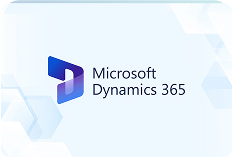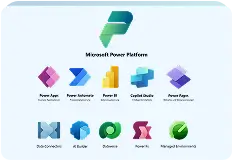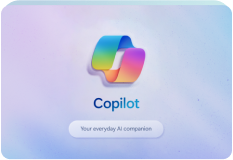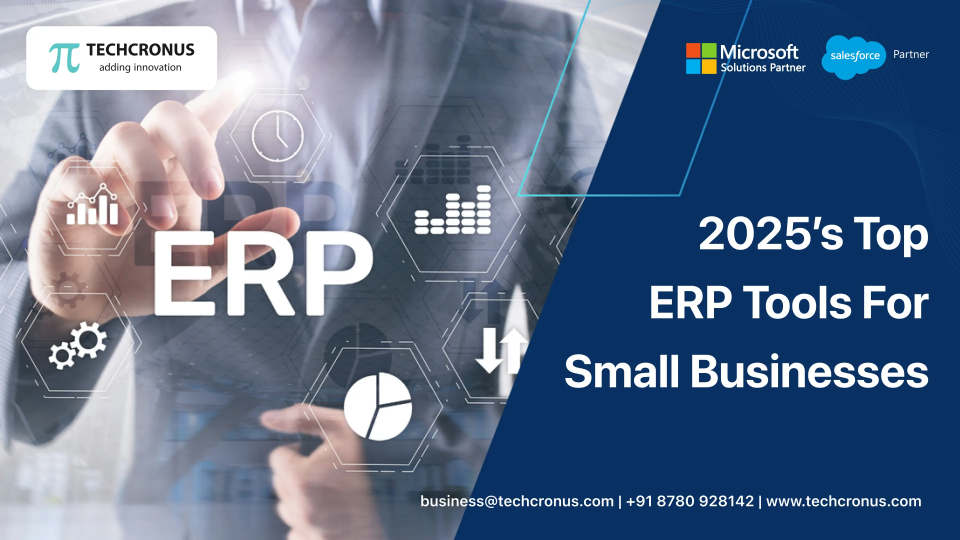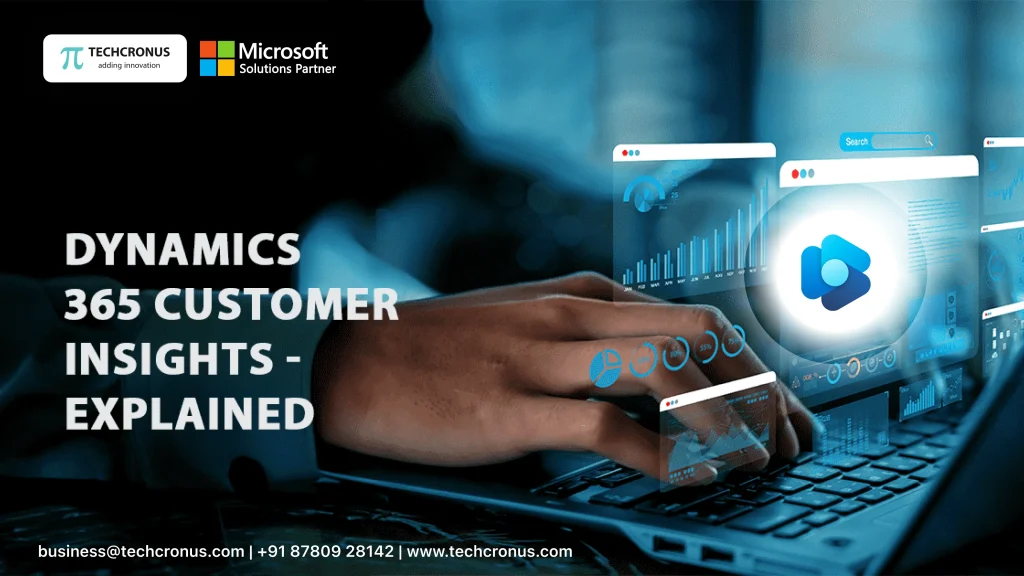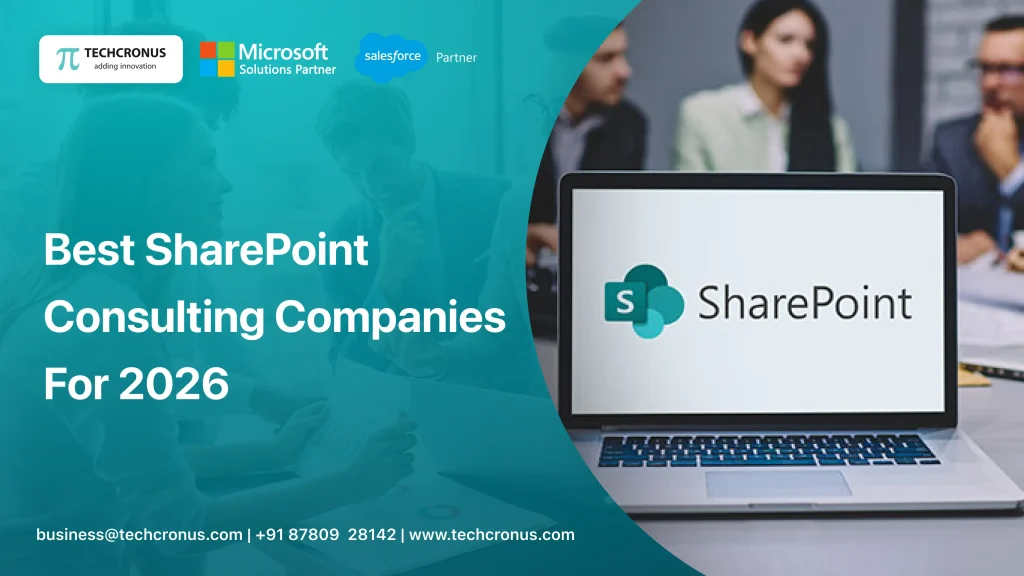Table of Contents
Figuring out which small business ERP software to go with in 2025 is like moving through a maze. There are numerous platforms, a multitude of features, and a vast array of opinions. This straightforward guide breaks down the terrain in simple terms, compares the best ERP systems for small businesses, and provides you with selection tips that you can immediately put into practice. Additionally, we will highlight ERP system examples across various industries, so you can understand what is employed in the real world.
Why it matters: A proper ERP system merges finance, inventory, sales, projects, and compliance into one single source of truth. In other words, there will be fewer spreadsheets, more cash flow visibility, less stock, and quicker decisions.
Throughout this guide, we will frequently reference Microsoft Dynamics 365, Microsoft Azure, and Dynamics 365 Business Central, as they’re especially popular among small and mid-sized teams transitioning to cloud-based small business ERP deployments. You’ll also find practical mentions of ERP systems for small businesses, ERP solutions tailored to small businesses, small business ERP systems, and even affordable ERP systems, where applicable. If you’d like help mapping requirements to a shortlist, Techcronus can assist with discovery, demos, and ROI modelling.
1) Microsoft Dynamics 365 Business Central
Business Central is one of the components of the Microsoft Dynamics 365 portfolio and serves as an ERP solution primarily focused on the small and medium-sized business sector. It gives a company the power to manage its finances, sales, purchases, warehouse, manufacturing, and services all through one merged financial, supply chain, project, manufacturing, and service management app. The app is created to function on Microsoft Azure and has individually functioning but interrelated modules that can be merged with Microsoft Dynamics 365 apps, Microsoft 365, and Power Platform.
Features of Dynamics 365 Business Central ERP
- Financials & Cash Management:
This system includes the fully integrated multi-currency GL, AR/AP, bank reconciliation, cash flow forecasts, automated deferrals, and fixed assets.
- Supply chain & inventory:
Feature-rich item tracking, serial lot management, reorder points, transfer orders, warehouse picks/put-aways, and demand forecasting are available.
- Projects & jobs:
WIP, resource allocation, timesheets, cost tracking, and profitability analysis are all there.
- Embedded AI & Copilot: Assisted with cash application, collections notes, late-payment prediction, and natural language help.
- Native Microsoft 365: Outlook invoicing/approvals, Excel analysis, and Teams collaboration.
Why SMBs choose it:
The main reason is the price being competitive with tier-1 ERPs, quick deployment, and the possibility of extension through AppSource. Usually, this becomes the speediest way to realize the value of a small business cloud ERP when a company is standardizing on Microsoft Azure and the Microsoft Dynamics 365 ecosystem.
2) Epicor
Epicor is an integrated software solution specially designed for manufacturers who produce either make-to-stock or make-to-order type products, distributors, and service providers. By virtue of its upgraded features like shop floor control, quality, and traceability, the platform turns out to be the perfect one for industries that are under close supervision and regulation.
Features of Epicor
- Constrained Production Scheduling:
Decide, allocate resources rationally, and avoid bottlenecks with the most up-to-date capacity. - Next-Gen Warehouse Management: Lead to stock accuracy through the full automation of processes such as tracking, picking, and replenishment.
- Quality & Compliance Tracking:
Keep traceability at all times through the implementation of lot/serial tracking and quality, which are recorded. - CPQ for Product Configuration:With the help of guided configuration rules, it is very quick and accurate to generate custom product quotes.
- Field Service & Contracts:
Organize service operations, technicians, customer contracts, and so on, in just one system.
Best fit for:
Discrete manufacturing, fabrication, industrial distribution, and automotive suppliers want ERP systems for small businesses that scale up without replatforming.
3) Oracle NetSuite
NetSuite is an entirely cloud-based suite that integrates ERP, CRM, eCommerce, and PSA. It’s well known for multi‑subsidiary consolidation and global financial controls, making it popular with high‑growth companies and franchises.
Features of Oracle NetSuite
- Core Financials:
Manage multi-book accounting and automated revenue deferrals for accurate reporting. - Order & Inventory:
Facilitate orders, purchasing, and forecasting for the optimal inventory of goods control. - Project Management:
Have an accurate account of project costs, assign resources, and check profitability without any hassle. - Dashboards & Searches: Easily retrieve the data you need with your customizable dashboards and searching, quick saved searches.
Best fit for:
A fast-growing business that requires unified cloud operations and robust multi-entity consolidations.
4) Sage Intacct
A finance-first cloud ERP that shines in dimensional reporting and subscription billing. Popular with services firms, software companies, non‑profits, and healthcare.
Features of Sage Intacct
- Core Financials:
Handle standard accounting in line with GAAP, including consolidation of multiple entities and automated reporting. - Dimensions Reporting:
Break down data by department, location, project, or item to get advanced insights. - Contracts & Billing:
Take care of SaaS subscriptions, recurring revenue, and contract-based billing as if it were a simple game of minutes. - Project Costing:
Keep a close eye on project expenses, time entries, and profitability even in real time. - Audit & Approvals:
Stay compliant with the help of strong audit trails and approval workflows under your control.
Best fit for:
CFO‑led transformations that begin with accounting and then move to operations through add‑ons and integrations.
5) Infor (CloudSuite)
Infor CloudSuite is a comprehensive solution with functionality and analytics deeply integrated, designed for manufacturing, distribution, and specialty verticals.
Features of Infor ERP Cloud
- Industry Suite:
The prebuilt solutions are available for the fashion, food, distribution, and industrial sectors. - Planning & Forecasting:
You can make your production process more efficient by using demand forecasting and taking advantage of the advanced scheduling tools. - Warehouse & Labor:
All the operations in a warehouse, as well as the workforce productivity, can be managed from one unified system. - Quality & PLM:
You can take care of compliance issues and have full control of the product lifecycle by using the integrated quality tools. - Embedded Analytics:
Birst-powered embedded analytics and dashboards provide you with up-to-the-minute insights.
Best fit for:
Businesses that want a verticalized small business ERP system strategy that they can quickly implement.
6) SAP (S/4HANA Cloud & SAP Business ByDesign)
In the cloud, SAP has several ERP options. Generally, S/4HANA Cloud is a product for large mid‑market and enterprise companies, while SAP Business ByDesign is a solution for midsize companies wanting a comprehensive and standard product suite.
Features of SAP S/4HANA
- Real-Time Analytics:
Perform analysis of any data immediately, thanks to the in-memory HANA database. - Advanced Finance:
Employ a universal journal with on-the-fly integration of regulations for finance that is easy to manage. - Manufacturing & Supply Chain:
Control the whole production, logistics, and supply chain process with one system. - Enterprise Controls:
Maintain the highest security, governance, and role-based control standards throughout operations.
Features of SAP Business ByDesign
- Financials & CRM:
Finance, CRM, procurement, and project management are at your fingertips with the help of integrated workflows. - Best-Practice Processes:
Benefit from pre-configured procedures, specifically designed to operate and manage the medium-sized business efficiently. - Global Capabilities:
Multi-country, multi-currency, and multi-tax features are available to support subsidiaries. - Dashboards & KPIs:
Get access to the dashboards based on roles and performance metrics that help make the right decisions.
Best fit for:
Enterprises with complicated global processes or scale programs that are willing to keep some operations in the cloud.
7) Oracle Fusion Cloud for Supply Chain & Manufacturing (and Finance)
Oracle Fusion Cloud is an integrated suite that covers ERP, SCM, and HCM. It is commonly used for its finance functionality, managing complicated supply chains, and AI-assisted processes.
Oracle Fusion Cloud ERP Features
- Advanced Financial:
Along with procurement, financials, and performance management, controls are a strong feature of the system. - Supply & Manufacturing:
Be in full control of supply planning, production processes, and product lifecycle management. - AI Automation:
With the help of AI embedded in the system, approvals, anomaly detection, and forecasts are done with high accuracy. - Global Compliance:
The system is ready for global tax rules, regulatory standards, and compliance requirements for various countries.
Best fit for:
Mature SMBs/upper mid‑market type businesses that are spread over several sites/entities and require strong governance.
8) IFS Cloud
Service-centric and asset-heavy industries are at the forefront of IFS Cloud’s focus, such as aerospace & defence, energy, utilities, and complex projects.
Features of IFS Cloud
- Asset & Service Management:
Gain control of enterprise assets and manage field service operations through the complete lifecycle that is visible. - Project-Based ERP:
Employ real-time financial tracking to keep a lid on project costs, budgets, and resources. - Manufacturing & Supply Chain:
Manage production, inventory, and distribution by integration of supply chain functionalities. - Maintenance & Mobile Tools:
Plan maintenance activities and, through mobile workforce tools, provide assistance to the field staff.
Best fit for:
These are the companies whose business models are based on service revenue, uptime, and asset lifecycle.
9) Acumatica
It is an adaptable, cloud-based ERP with a pay-per-use model and an open architecture. It is a good fit for distribution, construction, manufacturing, and services sectors and is equipped with a modern UX and mobile apps.
Features of Acumatica ERP
- Unified Business Suites:
Carry out financials, CRM, projects, distribution, and manufacturing by using one platform. - Construction Tools:
Control subcontracts, retainage, compliance, and project workflows in construction firms. - Open Integration APIs:
Connect systems and extend industry-specific functionality by using modern APIs. - Dashboards & Mobility:
Implement role-based dashboards and a fully mobile user interface to gain insights.
Best fit for:
Tech‑forward teams that value integrations and a licensing model that is in line with business growth.
10) Odoo ERP
Odoo is a modular, open-source platform that offers a wide range of apps – finance, inventory, sales, website, and more at a very reasonable cost of ownership.
Features of Odoo ERP
- Modular Apps:
Access accounting, CRM, inventory, eCommerce, and MRP through plug-and-play modules. - Low-Code Studio:
Easily customize workflows and screens with Odoo’s visual low-code builder. - Two Editions:
Decide between community (free) and enterprise (premium) according to the requirements. - Extensive Marketplace:
Get access to thousands of extensions to broaden the functionalities across different industries.
Best fit for:
Cost‑conscious teams that want the flexibility and the ability to control, including those who are looking into affordable ERP systems with a strategic roadmap.
11) SYSPRO
SYSPRO specializes in manufacturing and distribution with strong costing, lot tracking, and production control across SMB and mid‑market.
Features of SYSPRO ERP
- Inventory & Production:
Implement highly detailed inventory management and make production workflows more efficient and accurate. - Traceability & Quality:
Record every step of the product cycle and ensure the same quality standard throughout the company. - Financials & Analytics:
Obtain efficient financial management accompanied by up-to-the-minute reporting and insight for decision-making. - Industry Frameworks:
Implement customized templates for electronics, machinery, food, and industrial manufacturing.
Best fit for:
Manufacturers that require practical functionality to a fairly deep level, but without the complexity of an enterprise.
12) SAP Business One
SAP Business One is a core ERP solution with the essential functionalities targeted at small businesses. It offers delivery options for both on-premises and hosted/cloud.
Features of SAP Business One
- Core Operations:
Run the financials, sales, purchasing, and inventory operations through one platform. - Production & MRP:
Use the built-in MRP instruments to control production, materials, and capacity. - CRM & Service:
Improve customer relationships, service tickets, and post-sales support execution with the help of an efficient tool. - Localizations & Compliance:
Install the country-specific compliance packs for accurate tax and regulatory.
Good fit for:
Small firms are standardizing their processes and looking for an SAP ecosystem with partner support.
13) Tally Prime (Tally ERP)
Tally is an accounting software that is also used for GST compliance and inventory management in India and other parts of the world. Tally Prime brings a new look to the UI without compromising Tally’s speed and simplicity.
Features of Tally ERP
- Financial Accounting:
Take care of accounting, GST billing, taxation, and statutory compliance without any hassles. - Inventory Management:
Keep a check on stock, godowns, batches, and expiry details with absolute accuracy. - Banking & Payroll:
Make bank reconciliation a simple task through automation, and payroll management for employees can be done easily. - Remote & Audit Tools:
Work on your data from any location and ensure compliance through built-in auditing features.
Best fit for:
Small businesses that are transitioning from spreadsheets and are primarily concerned with statutory compliance.
14) Certinia ERP Cloud (formerly FinancialForce)
Certinia is a great match for services-led companies that need to tightly integrate sales, delivery, and finance, as it is built on Salesforce.
Features of Certinia Cloud ERP
- Services-Centric ERP:
Record projects, revenue, utilization, and service delivery all from one integrated platform. - Salesforce-Native Platform:
Benefit from a native Salesforce data model combined with powerful embedded analytics. - Subscription Billing:
Control subscription, usage-based, and recurring billing simply by using automation. - PSA, CPQ & Financials:
Essentially, sales, services, quoting, and financials can be coordinated without any trouble throughout the customer lifecycle.
Best fit for:
Professional services, consulting, and subscription businesses that run in Salesforce.
15) Workday
Workday is mostly known for its HCM and planning features. The complete offering is made up of Workday Financial Management and Adaptive Planning.
Features of Workday ERP
- Financial Management:
Run financials through automated processes and simple multi-entity consolidation. - Analytics & AI
Engage the embedded analytics and machine learning to illuminate and accelerate decision-making. - Planning & Forecasting:
Budgeting, planning, and forecasting will be accomplished easily with the help of Workday Adaptive capabilities. - Procure-to-Pay:
Implement procurement, purchasing, and expense management activities more effectively by using one common workflow.
Best fit for:
People‑centric companies that are looking for a combined finance + HR solution in the cloud.
Tips To Select an ERP System for Small Businesses in 2025
A great small business ERP software in 2025 can be quite challenging to choose without first understanding your processes, budget, and long-term goals. With numerous ERP systems for small businesses to choose from, it is essential to take a few practical steps first to narrow down the options to the right one:
Define Your Core Needs First
What are the 5–7 key areas of work that you want to make easier: accounting, inventory, sales, projects, or manufacturing? Knowing your top priorities will help you compare the right ERP software for your business efficiently.
Prefer Cloud for Agility
The majority of companies nowadays resort to small business ERP cloud solutions to benefit from faster implementation, reduced IT expenses, and automatic updates. Cloud also facilitates hybrid and remote teams, making them location-independent.
Check Industry Fit
Ensure that the small business ERP you select has the industry-specific features that you need. Manufacturing, distribution, and service-based companies are entirely different and thus require different capabilities.
Evaluate Total Cost of Ownership
You need to factor in license, implementation, training, integrations, and support costs to arrive at the real total cost. Sometimes, a business ERP software that looks affordable at first can turn out to be very expensive if it requires considerable customization.
Consider Scalability & Integrations
Your business will expand over time, and so should your ERP. Make sure that the small business ERP solutions you choose can easily integrate with CRM, HR, eCommerce, BI tools, and payment gateways.
Verify Vendor & Partner Support
An ERP system is not only about the product but also about the people who will help you implement it: vendor and partner support. Go for vendors who provide quality training, comprehensive documentation, and have well-tested deployment methods.
Test Before You Commit
Demo or trial access should be an essential part of every purchase decision. Only by practically exploring the workflows can you determine which ERP software for small businesses best fits your specific needs.
When working with tightly integrated Microsoft stacks, Techcronus recommendation is often small business ERP software based on Dynamics 365 Business Central, which offers the best combination of speed, cost, and extensibility.
Final Word
The process of picking an ERP system isn’t centered around the features of the system, but rather the outcomes that could be achieved by using it. It’s advisable to start from goals, lower your scope, and end up with a quick win. Whichever you decide to go with – NetSuite, Sage Intacct, Infor, or Dynamics 365 Business Central- make sure that your partner understands and can relate to the SMB realities. Techcronus can guide you to the right setup of small-business ERP software, and along with your growth, if you are putting your money on the Microsoft stack and Microsoft Azure.
Frequently Asked Questions
Q1. What are the most likely ERP systems to be chosen by small businesses in 2025?
Small businesses are going to a great extent make a choice of such ERP systems as Dynamics 365 Business Central, NetSuite, Sage Intacct, Acumatica, Epicor, Odoo, SAP Business One, and Infor CloudSuite in 2025. These are reliable and tested ERP systems for small businesses with an active partner ecosystem.
Q2. Can a cloud ERP be secure for a small team?
Yes, definitely. The top vendors operate their services on cloud platforms of very high standards (e.g., Microsoft Azure) that come with compliance, encryption, and are under constant monitoring. In most cases, cloud-based ERP solutions for small and medium businesses are even more secure than on-premise servers.
Q3. What is the best ERP software for a small business?
That depends on the circumstances. If you are mainly working with Microsoft products and desire a tight integration of Outlook/Excel/Teams, then Dynamics 365 Business Central is probably the best small business ERP software. NetSuite excels in the finance and commerce areas of multiple subsidiaries. If the main point is finance and a change is needed, then Sage Intacct would be the best choice. You should decide which solution supports your top 5 processes the best.
Q4. Can we afford ERP solutions for small businesses with limited budgets?
Yes, Odoo and Tally are commonly chosen as entry points. Even if a cheap ERP system, the company should not skimp on change management and training if it wants to see value realization fast.
Q5. Is it possible to make changes without impeding upgrades?
The current platforms allow additional features, APIs, and low-code capabilities. Microsoft’s Dynamics 365 and Dynamics 365 Business Central support Power Platform integration, which means you can automate a workflow and still be able to upgrade your system.



